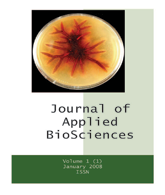Journal of Applied Biosciences (J. Appl. Biosci.) [ISSN 1997 - 5902]
Volume 38: 2508 - 2517. Published February 9, 2011.
Biotypes de Escherichia coli isolés des poissons et de l’eau de la lagune de Fresco, Côte d’Ivoire.
Kra Athanase KOUASSI, Adjéhi Thomas DADIE, Zinzendorf Yéssé NANGA, Koffi Marcellin DJE, Yao Guillaume LOUKOU
1University of Abobo-Adjamé, Department of Food Science and Technology / Laboratory of Biotechnology and Food Microbiology, Côte d’Ivoire; 2University of Cocody, Department of Pharmaceutical Sciences and Biology / National Laboratory of public health (LNSP), Côte d’Ivoire.
*Corresponding author e-mail:[email protected]
ABSTRACT
Objective: The study aimed to determine the prevalence of sulfite- reducing Clostridium species in beef meat cooked and sold in streets and in public restaurants in Abidjan.
Methodology and results: A total of 395 samples of beef meat were collected from eight municipalities of Abidjan. Sampling consisted of collecting of three types of ready to eat meat namely, cooked kebabs, cooked steaks and meats cooked in sauce. The isolated 222 (56.2%) strains of sulfite-reducing Clostridium species in all the samples analyzed. Four species were identified at different isolation frequencies, 13% (81) for Clostridium perfringens, 20.5% (27) for Clostridium difficile, 21.2% (91 strains) for Clostridium sporogenes and 23% for Clostridium septicum. With regard to the efficiency of various types of cooking, the results showed that 31.9% of 395 analyzed samples were not adequately cooked.
Conclusion and applications of results: It is concluded from this study that barbecued meat is a risk factor for Clostridium infection for the consumers in Abidjan. The cooked kebabs are the most contaminated products and should be avoided particularly by children and immuno-compromised persons. Measures to increase hygiene and awareness and improved handling and cooking of products should be promoted to reduce or eliminate the risks identified.
Key words: Sulfite reducing Clostridium, barbecued, meat, Abidjan
FULL PAPER [PDF AVAILABLE HERE]
